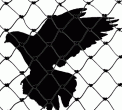
by Pigeon Patrol | May 30, 2023 | 4-S Gel Bird repellent, Animal Deterrent Products, Bird Deterrent Products, Bird Law, Bird Netting, Bird Spikes
The veterinary microbiologists at Karnataka Veterinary, Animal and Fisheries University (KVAFSU) studying the transmission of pathogenic microorganisms from pigeon feces have conducted awareness campaigns to educate people about the harmful effects of pigeon poop on human health.

Dr. KM Chandrashekar, an assistant professor of Veterinary Microbiology at the Veterinary College (Hassan), who is leading the awareness campaign says pigeons carry parasites, ticks, and fleas in their droppings, potentially spreading diseases. Wild birds usually carry more diseases than pet birds because pet birds’ immune systems are better at fighting off pathogens. People who come into contact with pigeon droppings or breathe in dust from dried droppings can get sick from various diseases.
What is pigeon poop?
Pigeon droppings look like small marbles and have a white-brownish appearance. If the droppings are loose and wet, it can be a sign that the bird is stressed or unhealthy.
Birds like Pigeons excrete nitrogenous waste in the form of uric acid instead of urea and ammonia, as they are uricotelic. Since birds do not have a urinary bladder, the uric acid is excreted along with their feces. Pigeon droppings are also related to promoting the growth of fungi. The presence of ammonia causes respiratory problems and irritation.
Research has shown that more than 60 different diseases can spread through pigeon droppings. It can cause fungal diseases like Histoplasmosis, Cryptococcosis, and Candidiasis, bacterial diseaes like Psittacosis, Avian tuberculosis, besides causing bird flu.
When inhaled, they affect the liver and spleen. High fever, pneumonia, blood abnormalities, and influenza are some visible symptoms.
How to avoid?
While cleaning pigeon droppings, it is advisable to use disposable gloves, shoe coverings, and masks with filters that can trap particles as small as 0.3 microns. It is also recommended to moisten the droppings slightly with water to prevent spores from becoming airborne. Once the droppings are cleaned, they should be stored in sealed bags, and the exterior of the bags should be washed before disposing of them in designated areas..
Source
Pigeon Patrol Products & Services is the leading manufacturer and distributor or bird deterrent (control) products in Canada. Pigeon Patrol products have solved pest bird problems in industrial, commercial, and residential settings since 2000, by using safe and humane bird
deterrents with only bird and animal friendly solutions. At Pigeon Patrol, we manufacture and offer a variety of bird deterrents, ranging from Ultra-flex Bird Spikes with UV protection, Bird Netting, 4-S Bird Gel and the best Ultrasonic and audible sound devices on the market today.
Voted Best Canadian wholesaler for Bird Deterrent products ten years in a row.
Contact us at 1 877-4-NO-BIRD,(604) 585-9279 or visit our website at www.pigeonpatrol.ca
Pigeon/Pigeon Patrol / Pigeons Roosing / Vancouver Pigeon Control / Bird Spikes / Bird Control / Bird Deterrent / PIgeon Deterrent / Surrey Pigeon Control / Pest / Seagull deterrent / Vancouver Pigeon Blog / Birds Inside Home / Pigeons in the cities / Ice Pigeons / What to do about pigeons / sparrows, Damage by Sparrows, How to Keep Raccoons Away, Why Are Raccoons Considered Pests / De-fence / Pigeon Nesting / Bird Droppings / Pigeon Dropping / woodpecker control / Professional Bird Control Company / Keep The Birds Away / Birds/rats/seagull/pigeon/woodpecker/dove/sparrow/pidgeon control/pidgeon problem/pidgeon control/flying rats/pigeon problems/ bird netting/bird gel/bird spray/bird nails/bird guard
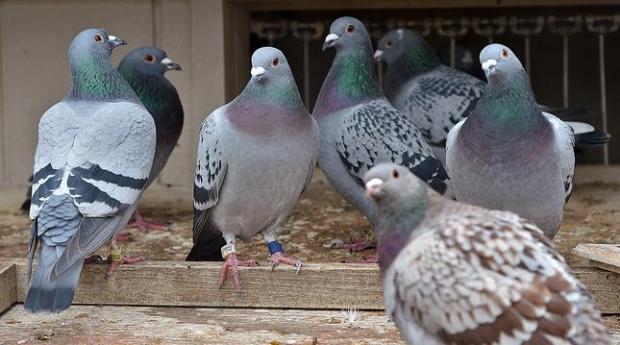
by Pigeon Patrol | May 23, 2023 | 4-S Gel Bird repellent, Animal Deterrent Products, Bird Deterrent Products, Bird Law, Bird Netting, Bird Spikes
Toronto is set to consider banning the feeding of pigeons across the city.
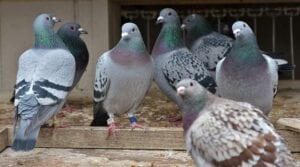
A motion proposed by Coun. Kristyn Wong-Tam seeks to prohibit the feeding of the birds in public and private spaces.
In her motion — which was to be reviewed by city council at a multi-day meeting that began Wednesday — Wong-Tam cited excessive pigeon droppings, social annoyance, property damage and the attraction of rats through discarded food scraps as reasons for the proposed ban.
“Those feeding Toronto’s pigeons may not be conscious of the adverse implications and unintended consequences resulting from their well-intended behaviour,” the motion states.
“Large flocks of birds in public and private spaces create harmful nuisance because they interfere with the enjoyment and use of public and private property.”
Sidewalks, plazas and laneways in Toronto have become “overwhelmingly inundated” with pigeons that continue to be attracted to those spaces because of food scattered by residents, the motion states.
‘Unhealthy and unsanitary conditions’
“In addition to the issues of social annoyance, excessive pigeon droppings from hundreds of birds concentrated in small areas can create unhealthy and unsanitary conditions,” the document adds.
The city already has a bylaw that bans feeding or attempting to feed wildlife in parks but that ban does not apply outside those green spaces. Wong-Tam argued in her motion that the existing bylaw has not been actively enforced.
“The lack of active and ongoing enforcement has rendered scarce green space as unusable. This is especially difficult to accept in densely populated neighbourhoods where such well-maintained and accessible parkland is desperately needed by Toronto families,” Wong-Tam said in the motion.
The motion recommends the municipal licensing and standards executive director report back to council next March on a possible pigeon-feeding ban.
That report would include exploring the feasibility of prohibiting pigeon-feeding in all public and private spaces in the city, and look at what kind of requirements would be needed to begin a “rapid-response investigation and enforcement” to prioritize any 311 complaints about pigeon feeding.
Another point the executive director would have to address, if the motion passes, would be consultations with Toronto Public Health while developing health and safety strategies “to address unsanitary conditions due to excessive amounts of droppings when pigeons are gathered in large numbers.”
Source
Pigeon Patrol Products & Services is the leading manufacturer and distributor or bird deterrent (control) products in Canada. Pigeon Patrol products have solved pest bird problems in industrial, commercial, and residential settings since 2000, by using safe and humane bird
deterrents with only bird and animal friendly solutions. At Pigeon Patrol, we manufacture and offer a variety of bird deterrents, ranging from Ultra-flex Bird Spikes with UV protection, Bird Netting, 4-S Bird Gel and the best Ultrasonic and audible sound devices on the market today.
Voted Best Canadian wholesaler for Bird Deterrent products ten years in a row.
Contact us at 1 877-4-NO-BIRD,(604) 585-9279 or visit our website at www.pigeonpatrol.ca
Pigeon/Pigeon Patrol / Pigeons Roosing / Vancouver Pigeon Control / Bird Spikes / Bird Control / Bird Deterrent / PIgeon Deterrent / Surrey Pigeon Control / Pest / Seagull deterrent / Vancouver Pigeon Blog / Birds Inside Home / Pigeons in the cities / Ice Pigeons / What to do about pigeons / sparrows, Damage by Sparrows, How to Keep Raccoons Away, Why Are Raccoons Considered Pests / De-fence / Pigeon Nesting / Bird Droppings / Pigeon Dropping / woodpecker control / Professional Bird Control Company / Keep The Birds Away / Birds/rats/seagull/pigeon/woodpecker/dove/sparrow/pidgeon control/pidgeon problem/pidgeon control/flying rats/pigeon problems/ bird netting/bird gel/bird spray/bird nails/bird guard
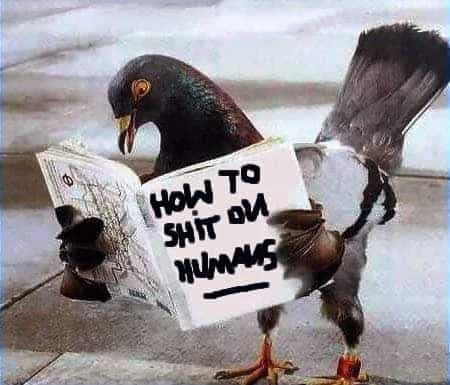
by Pigeon Patrol | May 18, 2023 | 4-S Gel Bird repellent, Animal Deterrent Products, Bird Deterrent Products, Bird Law, Bird Netting, Bird Spikes
What words come to mind when you think about pigeons? Nasty, dirty, gross — maybe just plain “ew“? Pigeons are ubiquitous to urban life, but humans are not generally fond of them. And while they may have a reputation for being the rats of the sky, author Rosemary Mosco is here to change that.
In her new book, “A Pocket Guide to Pigeon Watching: Getting to Know the World’s Most Misunderstood Bird,” Mosco, a bird-watcher and science communicator, argues that our ignorant assumptions about pigeons are all wrong. They are not the “rats of birds,” as some say. Rather, they are unique and intelligent dinosaur descendants that have been abandoned by today’s humans. Despite their tendencies to use their sharp beaks and claws to tear their way through human trash, the societal hatred toward pigeons is unwarranted. In fact, if only people really understood how special these birds are, perhaps we’d treat them better — or at the very least, give them the respect they deserve.
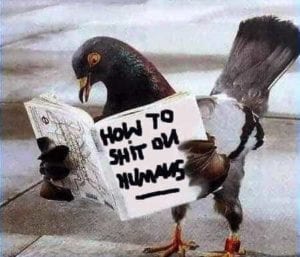
But Mosco isn’t painting these urban cooers as saviors to whom we should build shrines, either. Rather, she argues that we should seek to enjoy them instead of hating them. For instance, pigeon-watching could be a relaxing and entertaining activity for city dwellers, if not for our stigmas towards pigeons. Though it may sound like the realm of bird nerds, Mosco makes the case that pigeon-watching can be just as thrilling as traveling to your nearest national park to watch hawks.
Salon chatted with Mosco to learn more about why pigeons are so misunderstood, how to see beauty in them, and how people can enjoy the presence of pigeons instead of loathing them. This interview has been condensed and edited for print.
I’m curious about why you decided to write a book about pigeons, of all birds.
Well, I’ve been a bird watcher for most of my life. I really like how birds are pretty much everywhere. That means that anytime you’re bored, you just look around, and you’re going to be amused and pulled into [bird] drama — you’re going to see beautiful things.
I’ve also lived in all sorts of different cities, my whole life. So, pigeons are kind of a natural thing to start watching when you live in cities — and then the more you look at them, the more amazing they get.
Part of the book is about how pigeons are misunderstood. And I’m curious if you’ve come across someone in public who perhaps saw a pigeon and was like, “Ew, I hate pigeons.” What might you tell this person?
That did actually happen to me once. And it sort of triggered the idea for the book, or at least got the idea cooking.
I was waiting to catch the subway, and there was a woman waiting. She looked about my age, she was sort of frustrated and she took, like, a kick at a pigeon. She didn’t kick it, but did kind of threaten it. I was really shocked, and I said “Oh, don’t kick them,” and she just turned on me and said, “You know, they’re garbage, they’re trash, they shouldn’t be alive.”
Wow, that’s intense.
Yeah. And I thought, “what is it about pigeons that engenders that kind of intensity?” I’m really hoping that this book will help people understand why they’re here, and why they like to hang out on roofs, and maybe why we should be a little more understanding.
Can you summarize why people should be more understanding and kinder towards pigeons?
The wildest thing to me about pigeons, at least the city pigeons around us — there are different kinds of pigeons — that they are feral domesticated animals. They’re just like a dog, a cat, or a feral horse or a feral goat. They were domesticated by humans a really long time ago, thousands of years ago. But the difference with pigeons is that we’ve sort of forgotten that we domesticated them.
So we brought them from their homes in parts of Europe, Asia and North Africa, and then forgot why we did it. And now we’re sort of angry that these animals are in our space. And I think that that’s kind of a real shame, because you learn more about nature when you understand the history and the context of why they’re here.
When you put it into perspective like that, it’s really a sad story about humans abandoning these birds.
Right? And they were really bred to be good at living near us. And then, we forgot, and now they keep hanging around us. And we’re like, “why are they here?” Well, that’s why.
In the book you compare pigeons to dinosaurs and puppies, which I thought was really clever. Could you explain to our readers that connection?
A few different things happened. Probably the first is that they went feral, which would have happened pretty much around when we domesticated them; some of them would have gotten out. And then all of the reasons that we domesticated them became obsolete. So, I think of them as kind of like a fax machine. It used to be really useful to use pigeons for meat, and later they were useful for carrying messages, and to use them for their poop — which is an excellent fertilizer — and a whole bunch of other reasons, all of which have been replaced by technology, pretty much. Or in the case of meat, you know, we have factory farms with chickens now.
So they became obsolete. And then in New York in the 1960s, we started to blame them for a bunch of illnesses, in particular a meningitis outbreak. So then people started to think, ew, not only are they these sort of useless stray things, but also they’re getting sick. And up until then, for the most part people had pretty much held them in either neutral or really high esteem.
I was really surprised to hear the super-rich, back in the day, really valued pigeons. Or, how you said that pigeons were like, the original internet. Is there a way to reintegrate these uses back into our society?
Well, there are definitely places in the world where people still eat them, or still breed fancy pigeons So partly what’s going on is just that, where we live, people sort of got less into pigeons for this part. And there are even pigeon clubs in America — there are pigeon shows, like dog shows. I’ve never been to one, because I wrote this book mostly during the pandemic, but I really want to go to one.
But people are definitely being innovative with pigeons. There’s an artist who was attaching LED lights to pigeons and having them fly around, doing an organic drone show. And more and more, people are keeping them as pets, which I think is really interesting. You can carry them around on your shoulder and have them run around your house and you buy pigeon pants for them, which are basically diapers. There is this huge community of people online who have pet pigeons, they share cute photos . . . they definitely have a role to play.
I’m curious what surprised you the most about pigeons while you were reporting on this subject?
I think the most surprising fact about pigeons might be that they feed their babies milk. Both male and female pigeons are able to produce milk in this area of the digestive system called their crop. It’s really amazing. It’s stimulated by prolactin, which is the same hormone that stimulates breast milk in human women. It’s got proteins and fats and it helps boost the immune system. It’s so wild to me that they’ve independently evolved this way to support their babies, and it’s really interesting that both the males and the females can do it.
So that’s why it’s hard to raise pigeons in a factory farm setting, because they have to feed their children milk for the first few days, which is wild to me.
Then some of the wilder notes from history, like Nikola Tesla falling in love with a pigeon. She was the only love of his life; that blew me away.
For people who don’t really live near nature, do you think that pigeon watching can provide readers with a nature fix?
Yeah, for sure. There’s so much nature in our cities, and so much of it is connected with human culture and human history. And I feel like for a long time, people have written off urban nature, because they see it as not, like, “real” nature. But there’s so much cool stuff that you can see in cities, and you can really just immerse yourself in nature, even in the depths of the city. And pigeons can be a gateway for that.
Do you have any tips for people who are interested in getting into pigeon watching?
Yes, keep your eyes open and when you see some pigeons, give them a second look. Start to notice the different colors and patterns. If you see pigeons, maybe two pigeons near each other, ask yourself: “Are they a romantic mating-for-life pigeon pair?” They might very well be. Then look at their behavior. If they suddenly take off in the air, look for a falcon.
That’s kind of how you pigeon-watch, it’s pretty easy. You can do it when you’re commuting or when you’re grabbing lunch. Just give them a second look.
Source
Pigeon Patrol Products & Services is the leading manufacturer and distributor or bird deterrent (control) products in Canada. Pigeon Patrol products have solved pest bird problems in industrial, commercial, and residential settings since 2000, by using safe and humane bird
deterrents with only bird and animal friendly solutions. At Pigeon Patrol, we manufacture and offer a variety of bird deterrents, ranging from Ultra-flex Bird Spikes with UV protection, Bird Netting, 4-S Bird Gel and the best Ultrasonic and audible sound devices on the market today.
Voted Best Canadian wholesaler for Bird Deterrent products ten years in a row.
Contact us at 1 877-4-NO-BIRD,(604) 585-9279 or visit our website at www.pigeonpatrol.ca
Pigeon/Pigeon Patrol / Pigeons Roosing / Vancouver Pigeon Control / Bird Spikes / Bird Control / Bird Deterrent / PIgeon Deterrent / Surrey Pigeon Control / Pest / Seagull deterrent / Vancouver Pigeon Blog / Birds Inside Home / Pigeons in the cities / Ice Pigeons / What to do about pigeons / sparrows, Damage by Sparrows, How to Keep Raccoons Away, Why Are Raccoons Considered Pests / De-fence / Pigeon Nesting / Bird Droppings / Pigeon Dropping / woodpecker control / Professional Bird Control Company / Keep The Birds Away / Birds/rats/seagull/pigeon/woodpecker/dove/sparrow/pidgeon control/pidgeon problem/pidgeon control/flying rats/pigeon problems/ bird netting/bird gel/bird spray/bird nails/bird guard
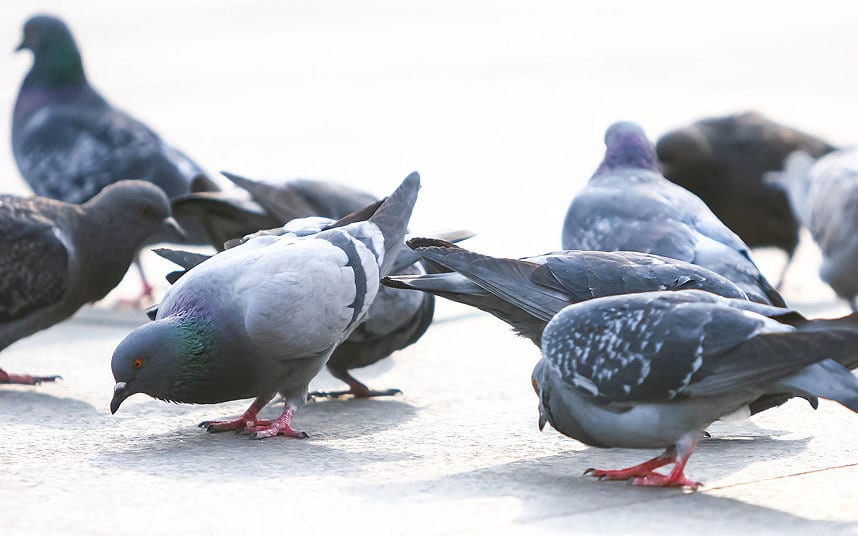
by Pigeon Patrol | May 9, 2023 | 4-S Gel Bird repellent, Animal Deterrent Products, Bird Deterrent Products, Bird Law, Bird Netting, Bird Spikes
A star racing pigeon named Armando has fetched a record 1.25 million euros in an online auction, Belgian media reported Sunday.
The prized bird—Belgian’s best long-distance racer of all time according to those in the know—was snapped up by a Chinese buyer for a princely sum that caused a flutter of excitement among fanciers.
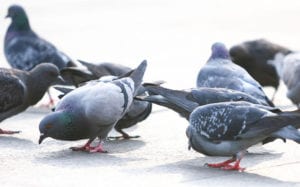
Armando had been expected to break the previous record of 376,000 euros ($425,000) paid for a pigeon called Nadine—but not by such a wide margin.
“Earlier this week it became clear that Armando would be the most expensive pigeon ever sold in an online auction,” wrote the specialist website Pigeon Paradise (Pipa.be).
“However, no one expected that the magical cap of a million euros would be pulverised,” it added. The final amount was 1,252,000 euros.
Pigeon Paradise did not say who had bought the pigeon, but according to the Belgian news agency Belga it was a Chinese buyer who will no doubt use his new acquisition to breed other champions.
Armando was just one of more than a hundred birds sold by respected Belgian breeder Joel Verschoot.
Verschoot’s stable of pigeons is based in Ingelmunster, in the west of Belgium, and his online auction of his pigeons has been open for several weeks.
By Sunday, the family had sold 178 pigeons for around two million euros.
Homing pigeons are raced by releasing them sometimes hundreds of kilometres from home, with the first back home winning.
Racing them is a tradition in Belgium, Britain, northern France and the Netherlands, although it has been going into decline.
But interest from Asian buyers in recent years has given the practice a new lease of life.
Source
Pigeon Patrol Products & Services is the leading manufacturer and distributor or bird deterrent (control) products in Canada. Pigeon Patrol products have solved pest bird problems in industrial, commercial, and residential settings since 2000, by using safe and humane bird
deterrents with only bird and animal friendly solutions. At Pigeon Patrol, we manufacture and offer a variety of bird deterrents, ranging from Ultra-flex Bird Spikes with UV protection, Bird Netting, 4-S Bird Gel and the best Ultrasonic and audible sound devices on the market today.
Voted Best Canadian wholesaler for Bird Deterrent products ten years in a row.
Contact us at 1 877-4-NO-BIRD,(604) 585-9279 or visit our website at www.pigeonpatrol.ca
Pigeon/Pigeon Patrol / Pigeons Roosing / Vancouver Pigeon Control / Bird Spikes / Bird Control / Bird Deterrent / PIgeon Deterrent / Surrey Pigeon Control / Pest / Seagull deterrent / Vancouver Pigeon Blog / Birds Inside Home / Pigeons in the cities / Ice Pigeons / What to do about pigeons / sparrows, Damage by Sparrows, How to Keep Raccoons Away, Why Are Raccoons Considered Pests / De-fence / Pigeon Nesting / Bird Droppings / Pigeon Dropping / woodpecker control / Professional Bird Control Company / Keep The Birds Away / Birds/rats/seagull/pigeon/woodpecker/dove/sparrow/pidgeon control/pidgeon problem/pidgeon control/flying rats/pigeon problems/ bird netting/bird gel/bird spray/bird nails/bird guard
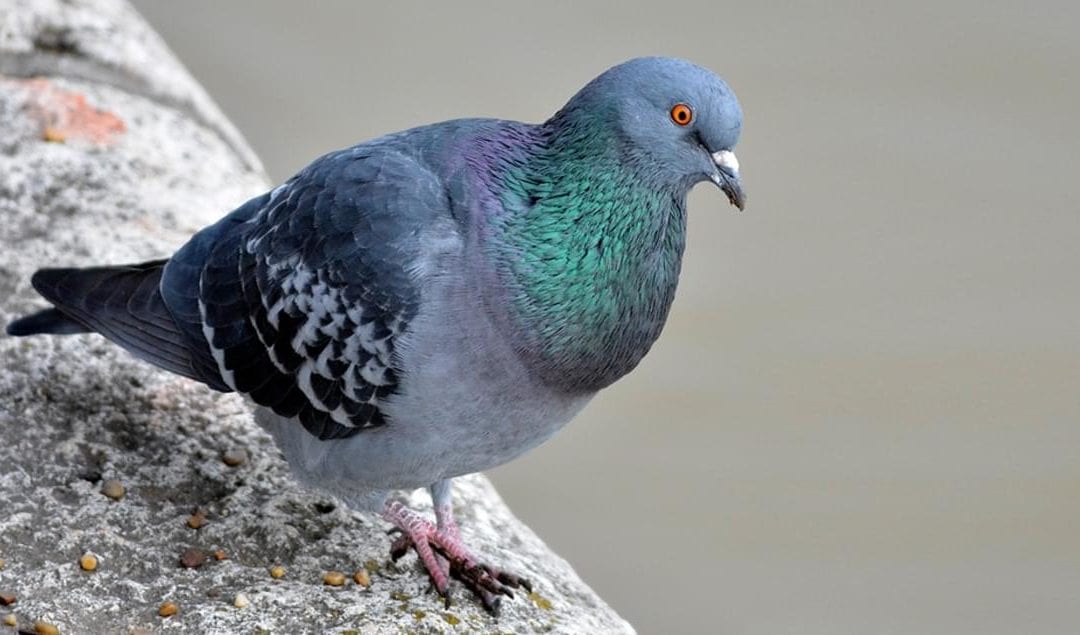
by Pigeon Patrol | May 9, 2023 | 4-S Gel Bird repellent, Animal Deterrent Products, Bird Deterrent Products, Bird Law, Bird Netting, Bird Spikes
For 53 years, large flocks of pigeons have called the Sid Buckwold Bridge home.
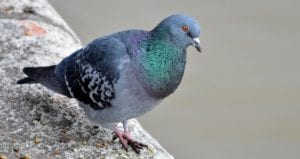
And for 53 years, they’ve also used it as a washroom.
The City of Saskatoon is embarking on a dirty mission to rid the bridge of 348 metric tonnes of pigeon poop over the next several months.
Angela Gardiner, the city’s general manager of transportation and construction, told Saskatchewan Afternoon that the collective weight of the droppings is equivalent to 232 mid-sized vehicles being parked on the bridge at all times.
She said the pigeons have been holing up inside utility cavities in the bridge and those provide a cozier home than other crossings in Saskatoon.
“Once we actually got in there over the last couple of years … the extent of the pigeon droppings was quite a bit more than we had anticipated,” Gardiner said.
She emphasized there hasn’t been any structural damage to the Sid Buckwold Bridge from the pigeon poop, but if it were left to stay, it could start wearing it out.
The pigeon droppings contain uric acid, which has the potential to eat away at the concrete used to build the crossing.
“There is a potential with any dead load like this that it could impact the structural integrity,” she said.
Specialized crews have been hired by the city to remove the droppings at the same time as rehabilitation work is done on the overall structure of the bridge.
In addition to the bridge cleanup, workers will install barriers to make it harder for birds to nest on the structure in the future.
However, the pigeons that have been displaced from the bridge will keep coming back — so Gardiner said the city plans to euthanize all 1,500 of them “humanely.”
“Part of the problem with pigeons is they’re homing birds, so if you just relocate them elsewhere, they’ll come back very quickly,” Gardiner said.
“If we fenced it off or prevented them from getting back there, they’ll just find a nearby location. I don’t think anyone wants 1,500 pigeons on their property.”
Source
Pigeon Patrol Products & Services is the leading manufacturer and distributor or bird deterrent (control) products in Canada. Pigeon Patrol products have solved pest bird problems in industrial, commercial, and residential settings since 2000, by using safe and humane bird
deterrents with only bird and animal friendly solutions. At Pigeon Patrol, we manufacture and offer a variety of bird deterrents, ranging from Ultra-flex Bird Spikes with UV protection, Bird Netting, 4-S Bird Gel and the best Ultrasonic and audible sound devices on the market today.
Voted Best Canadian wholesaler for Bird Deterrent products ten years in a row.
Contact us at 1 877-4-NO-BIRD,(604) 585-9279 or visit our website at www.pigeonpatrol.ca
Pigeon/Pigeon Patrol / Pigeons Roosing / Vancouver Pigeon Control / Bird Spikes / Bird Control / Bird Deterrent / PIgeon Deterrent / Surrey Pigeon Control / Pest / Seagull deterrent / Vancouver Pigeon Blog / Birds Inside Home / Pigeons in the cities / Ice Pigeons / What to do about pigeons / sparrows, Damage by Sparrows, How to Keep Raccoons Away, Why Are Raccoons Considered Pests / De-fence / Pigeon Nesting / Bird Droppings / Pigeon Dropping / woodpecker control / Professional Bird Control Company / Keep The Birds Away / Birds/rats/seagull/pigeon/woodpecker/dove/sparrow/pidgeon control/pidgeon problem/pidgeon control/flying rats/pigeon problems/ bird netting/bird gel/bird spray/bird nails/bird guard
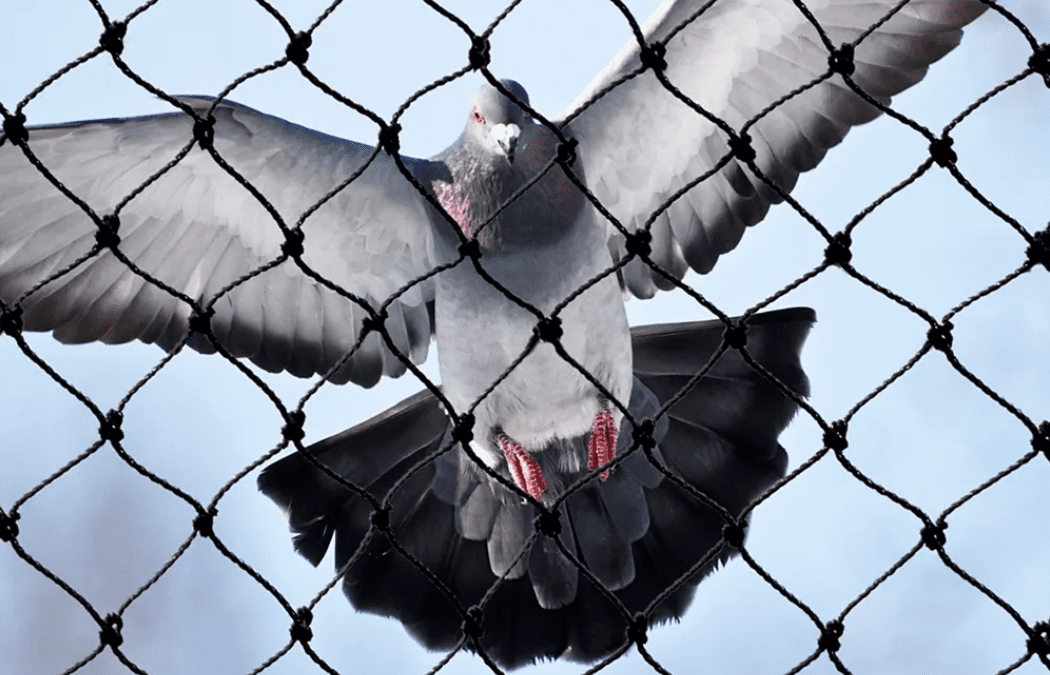
by Pigeon Patrol | May 2, 2023 | 4-S Gel Bird repellent, Animal Deterrent Products, Bird Deterrent Products, Bird Law, Bird Netting, Bird Spikes
A Toronto resident recorded a video of a man snatching pigeons in the city’s east end and when she tried to report it to officials, she said no one wanted to investigate.
On Sunday morning, Bruna Doberstein was on her way home when she witnessed a man and a child capturing the birds with a net and placing them inside a crowded cage in a parking lot at Lawrence Avenue East and Markham Road. That’s when she decided to take out her phone and start recording.
“I expected he would stop doing it after he saw that I was recording. But he didn’t. He seemed pretty comfortable doing it,” Doberstein told CityNews.
In the video, you can hear Doberstein asking the man why he was trapping the pigeons and that he “can’t do this,” in which he responds “Yes I can. I take them to my farm and I raise them.”
Doberstein said she didn’t buy it.
“He wasn’t being gentle. He was holding the birds by their wings. A person who would raise the birds would be at least careful and keep them safe” she said. “I don’t know the story but I know it’s not good.”
At that moment, Doberstein decided to call the police. She said that while the officer was courteous, she was told that it wasn’t their jurisdiction and they wouldn’t be sending an officer.
Instead they told her to call 311. But she said from past experience, Doberstein didn’t think they would be of any help in this matter.
This wasn’t the first time she witnessed the man capturing a cage full of birds and it also wasn’t the first time she tried reporting on what she witnessed.
“It was the second time I saw this guy. I recognized the truck from almost a year ago in August in the same parking lot.”
She told CityNews that last year she contacted a variety of different municipal and provincial departments with no luck, “I called PAWS (Provincial Animal Welfares services) and The Ministry of Nature and Forestry too and I never heard back.”
This kind of response isn’t unusual, according to Camille Labchuck, animal rights lawyer and executive director of Animal Justice.
“In my experience this is not uncommon when it comes to animal issues and law enforcement agencies,” said Labchuck. “Because a lot of people have authority also means that nobody does, leading to nobody wanting to pick it up and run with it.”
While Labchuck and her team are disappointed that Toronto Animal Services and police didn’t do more, they ultimately had more success with reporting the incident to Provincial Animal Welfare Services and the Ministry of Natural Resources and Forestry.
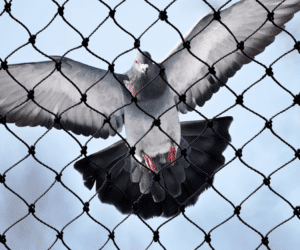
bird netting vancouver
“PAWS is the agency that took over enforcement from the OSPCA two years back. They are tasked with investigating any animal cruelty problems.” Labchuck explained. Something many people may not be aware of.
Since the OSPCA announced in 2019 it will no longer enforce animal cruelty laws, there has been no clear guidance of who one should contact to report, investigate and enforce animal cruelty laws.
“You got a man roughly handling birds by the wings which is not permitted,” Labchuck said. “To say nothing of the fact that he shouldn’t be interacting with pigeons anyways. They are protected species under the federal Migratory Bird Convention Act”.
The Ministry of Natural Resources and Forestry are in charge of enforcing the wildlife act. Labchuck said there could be a clear violation here as residents can’t interact with native wildlife without a permit.
However, while both departments took down information, neither would accept the video at this stage.
“They both advised that providing the video would be a next step if an enforcement officer requires it. Kind of bizarre as it’s relevant evidence at the outset,” Labchuck said.
In 2015, the illegal trapping of pigeons became a widespread issue in the city of New York after hundreds were believed to be stolen for live pigeon shoots in neighbouring states.
Source
Pigeon Patrol Products & Services is the leading manufacturer and distributor or bird deterrent (control) products in Canada. Pigeon Patrol products have solved pest bird problems in industrial, commercial, and residential settings since 2000, by using safe and humane bird
deterrents with only bird and animal friendly solutions. At Pigeon Patrol, we manufacture and offer a variety of bird deterrents, ranging from Ultra-flex Bird Spikes with UV protection, Bird Netting, 4-S Bird Gel and the best Ultrasonic and audible sound devices on the market today.
Voted Best Canadian wholesaler for Bird Deterrent products ten years in a row.
Contact us at 1 877-4-NO-BIRD,(604) 585-9279 or visit our website at www.pigeonpatrol.ca
Pigeon/Pigeon Patrol / Pigeons Roosing / Vancouver Pigeon Control / Bird Spikes / Bird Control / Bird Deterrent / PIgeon Deterrent / Surrey Pigeon Control / Pest / Seagull deterrent / Vancouver Pigeon Blog / Birds Inside Home / Pigeons in the cities / Ice Pigeons / What to do about pigeons / sparrows, Damage by Sparrows, How to Keep Raccoons Away, Why Are Raccoons Considered Pests / De-fence / Pigeon Nesting / Bird Droppings / Pigeon Dropping / woodpecker control / Professional Bird Control Company / Keep The Birds Away / Birds/rats/seagull/pigeon/woodpecker/dove/sparrow/pidgeon control/pidgeon problem/pidgeon control/flying rats/pigeon problems/ bird netting/bird gel/bird spray/bird nails/bird guard












